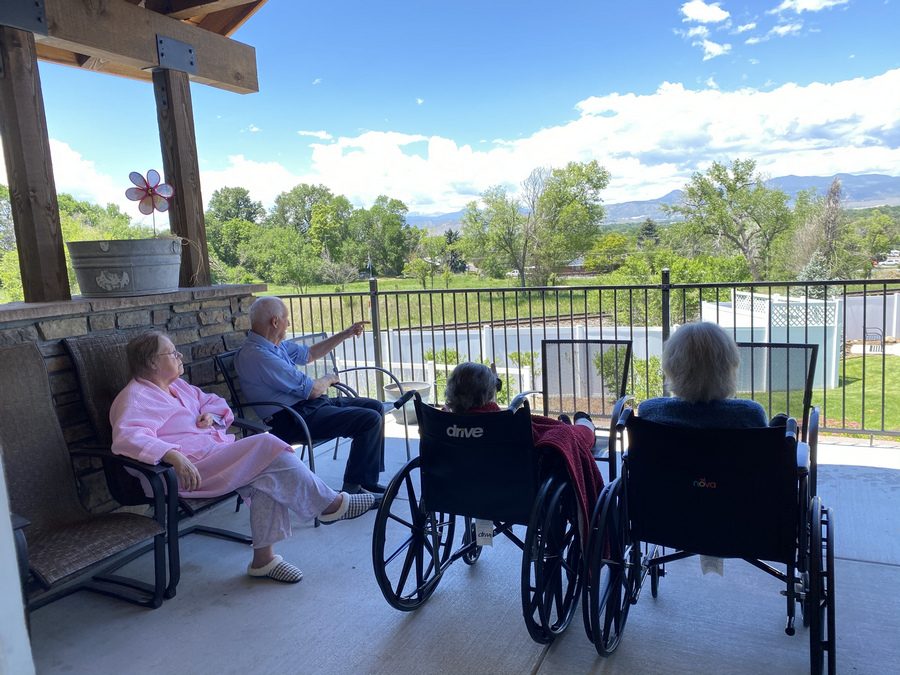Boutique Memory Care Communities That Feel Like Home
Boutique Memory Care Communities That Feel Like Home
Blog Article
All About Memory Care Services: Why Tiny Memory Care Houses Are a Fantastic Option
Memory treatment solutions play an essential duty in supporting people with Alzheimer's and mental deterioration. Tiny memory treatment homes stand apart for their personalized strategy and intimate setting. With lower staff-to-resident proportions, these homes promote more powerful connections and customized care. Locals benefit from boosted social communications and a safe environment. As family members check out choices, understanding the distinct benefits of little memory care homes ends up being crucial. What variables should be thought about when choosing the best home?
Recognizing Memory Care Provider
While lots of may recognize with basic elderly care options, comprehending memory care solutions is important for family members encountering the challenges of cognitive decrease. Memory care particularly caters to people with problems such as Alzheimer's illness and various other types of mental deterioration. These solutions give an organized atmosphere that concentrates on boosting the lifestyle for residents with specialized treatment and support.Memory care centers are developed to ensure safety and safety, typically featuring protected atmospheres to stop roaming. Educated team member are readily available all the time to help with daily activities, medicine administration, and personal treatment. Additionally, memory care programs often include cognitive stimulation tasks, tailored to involve locals and advertise psychological wellness. Family members can take advantage of understanding these solutions, as they allow informed decisions regarding their loved ones' treatment, making sure that their specific needs and choices are dealt with in a caring and supportive manner.
The Advantages of Tiny Memory Treatment Houses
Tiny memory treatment homes provide distinct advantages that can considerably improve the top quality of life for citizens with cognitive problems. One substantial advantage is the intimate environment, which enables personalized communications among team and residents. This smaller setup cultivates purposeful partnerships, decreasing feelings of seclusion and anxiousness frequently experienced by individuals with memory issues.Additionally, the lower staff-to-resident ratio in tiny memory treatment homes allows caretakers to supply more alert guidance and support. This strategy not just boosts security yet also advertises a complacency for the residents.Moreover, little memory care homes can adjust rapidly to the special needs and choices of each citizen, permitting a much more homelike environment. Such a setting can motivate social involvement and participation in activities, inevitably improving the daily experiences of those living with cognitive impairments.
Personalized Care Program for Residents
Individualized care strategies are important in memory treatment homes, as they cater to the special needs and choices of each citizen. These plans start with detailed assessments conducted by proficient specialists, that review cognitive abilities, medical history, and personal rate of interests. This tailored method warranties that care is not just efficient however likewise respectful of each individual's dignity and autonomy.Moreover, personalized care strategies are adaptable, allowing adjustments as citizens' demands develop gradually. This adaptability cultivates a feeling of protection and experience, which is necessary for people living with memory difficulties. Caretakers are trained to execute these plans consistently, supplying assistance that aligns with the residents' regimens and preferences.Ultimately, personalized care plans boost the top quality of life for residents by advertising independence, interaction, and health, making them a basic aspect of memory treatment services in small memory treatment homes.
Producing a Home-Like Setting
Creating a home-like environment is essential for promoting comfort and experience in memory care settings, as it significantly affects residents' emotional well-being. Little memory care homes commonly prioritize customized touches, such as cozy color schemes, family pictures, and acquainted furnishings plans, which help residents really feel more at convenience. Integrating elements evocative a conventional home, like cozy living rooms and public locations, encourages a sense of belonging.Moreover, making use of natural light and outdoor rooms can boost the ambience, promoting relaxation and tranquility. Personnel members play a substantial role in maintaining this atmosphere by engaging with locals in a compassionate manner, treating them like family. Routine activities, such as food preparation or gardening, can also add to a home-like feel, supplying opportunities for residents to join meaningful experiences. Overall, creating a supporting environment sustains cognitive feature and emotional security, making it a necessary facet of memory care services.
Enhanced Social Communication and Community
Enhanced social communication and community are vital elements of memory care services. By promoting personalized social involvement and developing a family-like ambience, these solutions promote meaningful links amongst homeowners. Group activities and events better urge participation, assisting individuals feel a lot more included and sustained.
Customized Social Engagement
While social communication is crucial for total wellness, lots of people with memory disabilities frequently have a hard time to involve meaningfully with others. Individualized social involvement in memory care homes addresses this challenge by developing tailored tasks that accommodate residents' unique interests and capabilities. By focusing on individual preferences, caregivers can foster links that resonate deeply with each individual. Tasks such as art treatment, music sessions, and assisted conversations advertise cognitive stimulation and psychological expression. Additionally, small team settings motivate sociability and permit more intimate communications, improving feelings of belonging. This strategy not just fights sensations of seclusion yet also equips homeowners to preserve a feeling of identity, eventually contributing to improved mental health and high quality of life.
Family-like Atmosphere
In a memory treatment setting, promoting a family-like atmosphere considerably improves social communication and develops a sense of neighborhood among homeowners. Smaller sized memory treatment homes typically prioritize intimate environments, enabling homeowners to develop closer links with each other and employee. This nurturing atmosphere advertises trust fund, which is important for people with memory problems. Homeowners are much more most likely to talk and share experiences, creating an encouraging network that relieves sensations of solitude. The familiarity of common rooms and regimens adds to a sense of belonging, additionally motivating social interaction (personalized memory care). In such setups, psychological bonds flourish, leading to boosted total health and a better of life for residents as they browse their daily experiences with each other
Group Activities and Occasions

Safety And Security and Protection Functions in Little Homes
Many tiny homes made for memory treatment integrate crucial safety and safety and security features to guarantee the wellness of locals. These homes frequently make use of protected entrance and leave indicate stop roaming, a typical problem among people with memory disabilities. Furthermore, security systems and alarm mechanisms improve monitoring, guaranteeing that personnel can promptly react to go to this site any kind of uncommon activities.Interior layouts are tailored for safety and security, with reduced threats such as sharp corners and clutter-free paths. Handrails and non-slip flooring are normally mounted to lower the danger of falls. Team member are learnt emergency procedures, ensuring they are prepared for numerous situations.Moreover, individualized treatment plans may include assessment of private safety needs, supplying customized options for each resident. Overall, these security and security features click for more info produce a nurturing environment where homeowners can prosper while keeping their dignity and independence.
How to Choose the Right Memory Treatment Home
How can family members guarantee they choose the most ideal memory care home for their liked ones? The choice requires mindful factor to consider of numerous aspects. First, households must examine the facility's personnel credentials and training, guaranteeing that caregivers are experienced in taking care of memory-related problems. Next off, it's vital to analyze the home's atmosphere, concentrating on security features and whether it fosters a sense of community and belonging. Checking out the center can provide insight right into daily tasks and the social atmosphere, which are important for mental stimulation and psychological well-being. Additionally, families must ask about the treatment strategies offered, guaranteeing they are tailored to individual needs. Considering the home's place and availability for family members sees can add to a smoother shift. By attending to these facets, families can make an educated choice that prioritizes their loved one's convenience and lifestyle in a memory treatment setup.
Regularly Asked Questions
What Certifications Should Personnel Members in Memory Treatment Houses Have?
Team member in memory treatment homes should possess relevant qualifications, experience in dementia care, solid interaction skills, and compassion. Recurring training in behavior management and therapeutic treatments improves their capability to support homeowners efficiently.
Just How Do Memory Care Provider Differ From Traditional Assisted Living?
Memory care services concentrate particularly on people with memory disabilities, offering customized support and structured atmospheres. In contrast, traditional assisted living supplies basic help with day-to-day tasks, doing not have the tailored method necessary for those with cognitive obstacles.
What Types of Activities Are Provided in Memory Care Residences?
Memory treatment homes commonly provide a variety of activities developed to engage citizens. Usual options include art treatment, songs sessions, cognitive games, physical workouts, horticulture, and get-togethers, all focused on enhancing health and cognitive feature.
Can Residents Bring Their Own Possessions to Memory Care Homes?
Locals can usually bring their own items to memory care homes, allowing them to individualize their home - personalized memory care. This practice assists develop a familiar environment, advertising comfort and a sense of identification for the people

Just How Are Member Of The Family Associated With the Care Process?
Household participants play an important duty in the treatment process, usually taking part in decision-making, going to care meetings, and providing emotional support. Their participation promotes a collective environment, improving the local's general well-being and lifestyle. While several may be familiar with basic elderly treatment alternatives, recognizing memory care solutions is important for families facing the difficulties of cognitive decline. These services provide an organized setting that focuses on boosting the quality of life for citizens via specialized care and support.Memory care facilities are designed to guarantee safety and safety, small memory carehomes Charlotte typically featuring protected settings to prevent roaming. Personalized care plans are essential in memory treatment homes, as they cater to the unique needs and preferences of each citizen. Staff participants in memory treatment homes should possess appropriate certifications, experience in dementia care, solid communication abilities, and compassion. Memory care services focus especially on people with memory disabilities, supplying customized support and organized environments.
Report this page